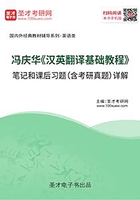
4.4 考研真题详解
1. 找遍了化学书,在炭气、氧气以至于氯气之外,你看不到俗气的。[北大2007研]
【译文】In search of all the chemical books, you can find carbon dioxide, oxygen, chlorine, but you can never see a gas called “vulgar air.”
【解析】将动词“找”译为介词短语“in search of”,强调了“找遍”这一过程。
2. 但是如果我们在科学还不是那么发达的时候没有勇气反思的话,我们将有可能直接地与未来的邪恶狭路相逢。[中国人民大学2007研]
【译文】But if we lack the courage to make self-retrospection when science is not that sophisticated, we are likely to encounter the evilness of the future.
【解析】将动词“反思”转译为名词,“self-retrospection”更符合英文的表达习惯。
3. 口译者把原文译为口语,光景不免有多少歪曲,再由林氏将口语译为文言,那就是第二次歪曲了。[北师大2005研]
【译文】The first version from original text to colloquialism would more or less depart from author’s intention. Then the second distortion happened when Lin transferred the colloquialism into classical Chinese.
【解析】译者并未将“译为”直接译出,而是将其转化为名词短语“the first version”,是因为下文还有动词“译为”,以免重复。
4. 在我的小院中,到夏天,满是花草,小猫儿们只好上房去玩耍,地上没有它们的运动场。[北师大2006研]
【译文】In summer, flowers and plants growing in luxuriance in my small courtyard will leave little open space as a playground for the little cats, so they have to sport about in our rooms instead.
【解析】“玩耍”一词没有直接译出,因为“playground”一词已包含“玩耍”之意,省去不译更显简洁,且语义完整。
5. 我常常遗憾我家门前的那块丑石呢:它黑黝黝地卧在那里,牛似的模样;谁也不知道是什么时候留在这里的,谁也不去理会它。[北师大2003研]
【译文】I used to feel sorry for that ugly black piece of stone lying like an ox in front of our door; no one knew when it was left there and nobody paid any attention to it.
【解析】“遗憾”明显的带有人的感情色彩,用be动词或其他弱化的动词(如feel)和形容词连用,译为“feel sorry”更能体现作者对丑石所持的态度。
6. 芸问曰:“今日之游乐乎?”众曰:“非夫人之力不及此。”大笑而散。[对外经贸大学2005研]
【译文】“Did you enjoy it today?” asked Yun. “We should not have enjoyed it so much, had it not been for Madame!” all of us exclaimed. Then merrily we parted.
【解析】原文连用了两个动词,将动词“笑”译为副词“merrily”,表状态,使句子结构更紧凑。
7. 国庆节常回家,那个黄河边上的乡村,开小汽车的乡亲开始多见,虽然他们穿衣打扮还没有太多的改变,但当我看到他们开上价值20多万的汽车时,我很是欣喜。[北京外国语大学2009研]
【译文】I returned to my hometown during the National Day holiday. In the village on the Yellow River, I saw more and more people driving cars. Although their appearance has not changed much, I was excited to see them own cars that cost over 200,000 yuan.
【解析】“穿衣打扮”本是动词,译者直接将其概括为“their appearance”,简洁明了,也能更准确地传达词义。
8. 那么,跨出国门即外交无小事,正所谓细节决定成败。[北京外国语大学2009研]
【译文】However, at abroad, there is no trivial matter in diplomacy. As the saying goes, detail is the key to success.
【解析】将动词“决定”译为名词短语“the key to”,更能凸显这种决定性因素的重要性。
9. 我们坚决维护国家主权、安全、发展利益,决不会屈服于任何外来压力。[北京外国语大学2013研]
【译文】We are firm in our resolve to uphold China’s sovereignty, security and development interests and will never yield to any outside pressure.
【解析】将动词“维护”译为名词“resolve”,更符合译入语的表达习惯。
10. 中国主张和平解决国际争端和热点问题,反对动辄诉诸武力或以武力相威胁,反对颠覆别国合法政权,反对一切形式的恐怖主义。[北京外国语大学2013研]
【译文】China is committed to peaceful settlement of international disputes and hotspot issues, opposes the wanton use of force or threat to use it, opposes any foreign attempt to subvert the legitimate government of any other countries, and opposes terrorism in all its manifestations.
【解析】将动词“和平解决”翻译为偏正短语“peaceful settlement”更符合译入语的表达习惯。
11. 只要下了决心,持之以恒,习惯也还是可以改的。[华南理工大学2018研]
【译文】With strong resolution and perseverance, we can certainly break ourselves of old habits.
【解析】动词转为介词短语。原句中的动词短语“下了决心,持之以恒”转译为英文介词词组“With strong resolution and perseverance”。